-- Brad Friedman from Denver, CO...
We had the chance to interview former Alabama Gov. Don Siegelman inside the Pepsi Center on Wednesday, during the Democratic National Convention.
Our concise conversation ranges from the Congressional Democrats' failure to call for a full House vote on Contempt of Congress by Karl Rove, Siegelman's 2002 election which he believes was "stolen electronically," the corporate media's inability to investigate or report on it, and the concern about whether or not Democrats will be in a forgive and forget mode after this session of Congress if Obama is successful in his quest for the White House.
Here's our complete interview (appx. 6 mins)...
Some pull-quotes from the interview...
On Rove: "If we do not vote the contempt citation, Karl Rove is simply going to get in his getaway car and thumb his nose at the Constitution, Congress, and the American people. It creates almost two systems of justice: one for the powerful, those connected to the White House, and then another system for you and me and the rest of the people."
On Democrats: "Democrats are so magnanimous in victory, as they were after Watergate, they did nothing. After the Iran-Contra scandal, they did nothing. But what Democrats are going to want to do is get on with positive programs, to fix the damage that has been done by the Bush administration...But I view this as part of that positive change. Finding out who hijacked the Department of Justice and who used it as a political weapon."
On his 'stolen' 2002 election: "I went to bed the winner. The media had been sent home. The pollworkers had been sent home. The party chairmen had been given their copies of the election results. And then after midnight a light went on in the basement of the capitol, the basement of the courthouse, in the sheriff's office, and 5,200 votes that were mine were shifted to my opponent."
The complete text transcript of the interview follows in full below (thanks to Emily Levy of VelvetRevolution.us)...
by Brad Friedman of BradBlog.com
Democratic National Convention
August 27, 2008
BRAD FRIEDMAN: Governor Don Siegelman, happy to see you a free man, for now, at the Democratic National Convention.
GOV. DON SIEGELMAN: Not as happy as I am for you to see me a free man.
BF: I bet. Any luck with the Judiciary Committee, government committees, getting these investigations done on Karl Rove and their connection to your case?
DS: Well, we've had success because of the persistence of a few very strong Congressmen and Chairman Conyers. But even though we have a contempt citation out of committee, it really means nothing unless the full House votes on this when they get back from recess. So my purpose here at the Democratic National Convention is to convince the members of Congress that we have to have this on the agenda when they get back from this recess.
BF: And what kind of response are you getting from these folks?
DS: Well, we're getting a good response from the rank and file members of the House. They want this contempt citation voted on. If we do not vote the contempt citation, Karl Rove is simply going to get in his getaway car and thumb his nose at the Constitution, Congress, and the American people. And it sends absolutely the wrong message. It creates almost two systems of justice: one for the powerful, those connected to the White House, and then another system for you and me and the rest of the people.
BF: And if they do not vote in the full House this session, does that mean the contempt, it goes away?
DS: It means, this is my interpretation: Democrats are so magnanimous in victory, as they were after Watergate, they did nothing. After the Iran-Contra scandal, they did nothing. But what Democrats are going to want to do is get on with positive programs, to fix the damage that has been done by the Bush administration. And so... but I view this as part of that positive change. Finding out who hijacked the Department of Justice and who used it as a political weapon, and restoring justice and preserving our democracy crosses party lines. This is about America. It's not about Republicans and Democrats, it's about right and wrong.
BF: And do you, the sense that they're going to go positive, if you will, if they win in November, after this administration --- Is that a sense you get, or are they actually telling you, "Look, if this doesn't happen now, it's not going to happen afterwards?"
DS: I'm not being told that. But I just know from... history teaches us that Democrats have always looked to change. They want to, they want to fix the problems and even though this is a very important problem, it's viewed by some as a negative, something that's dwelling in the past and not looking to the future. That, I think, is looking at it the wrong way. Because I think this is such an important issue. Not just finding out who did it …
BF: Yeah.
DS: … but fixing it so that it doesn't happen again.
BF: You've spoken, I know, to a lot of folks in the corporate mainstream media about what happened in 2002. You went to bed the winner, that night, of the election. You woke up. They found numbers had, as I think you put it, been electronically manipulated in...Baldwin County, was it?
DS: Baldwin County. I went to bed the winner. The media had been sent home. The pollworkers had been sent home. The party chairmen had been given their copies of the election results. And then after midnight a light went on in the basement of the capitol, the basement of the courthouse, in the sheriff's office, and 5,200 votes that were mine were shifted to my opponent. And when I asked for a recount, Karl Rove's client, the Attorney General, said he was going to put anybody in jail who tried to recount those votes.
BF: You say a light went on?
DS: Well …
BF: Literally, or … ?
DS: No, they actually had closed the courthouse. And everybody had left except for just a few people in the basement in the sheriff's office.
BF: So we know that in fact they were there in the middle of the night doing something. Nobody knows what it was?
DS: Absolutely.
BF: And you told that story, I think, to, I remember, Washington Post, Dan Abrams. Has anybody picked up on that angle of your story in the corporate media? Because I haven't heard it.
DS: No, not really. It is one of those things that, it happened... you know, people don't want to believe that elections are stolen in this country. They don't want to believe that we go to war under false premises. And they don't want to believe that their Department of Justice is used as a political tool. But in fact, in this administration, one can argue that those things have indeed happened.
BF: Is it your suspicion that your election was stolen electronically, or is it your belief that it was?
DS: Oh, it's not just my belief. People who've looked at this election and have studied the figures --- they've done regressive analysis of voting trends --- say it's a statistical impossibility. There was electronic voting manipulation in the 2002 governor's race in Baldwin County.
BF: Do the records, the database records, from that election still exist somewhere?
DS: No.
BF: They've been destroyed?
DS: Those have been destroyed.
BF: Governor, good to talk to you. Good to see you out of jail. Keep up the good work and thank you for making noise.
DS: Absolutely. Thank you, Brad.
BF: Thank you, sir.
Transcribed by Emily Levy


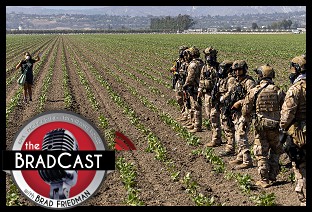 Trump Labor Dept. Warns Trump Policies Sparking Food Shortage, Farmworker Crisis: 'BradCast' 10/9/25
Trump Labor Dept. Warns Trump Policies Sparking Food Shortage, Farmworker Crisis: 'BradCast' 10/9/25 'Green News Report' 10/9/25
'Green News Report' 10/9/25
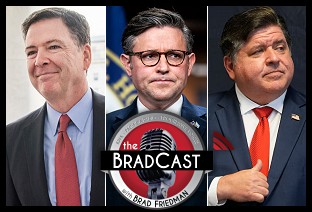 Trump's Losing Battles: 'BradCast' 10/8/25
Trump's Losing Battles: 'BradCast' 10/8/25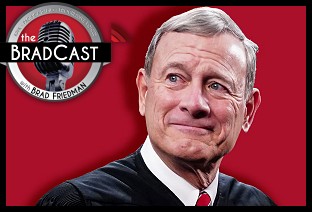 'Supreme Arrogance': Trump, John Roberts and His Stacked, Packed and Captured SCOTUS: 'BradCast' 10/7/25
'Supreme Arrogance': Trump, John Roberts and His Stacked, Packed and Captured SCOTUS: 'BradCast' 10/7/25 'Green News Report' 10/7/25
'Green News Report' 10/7/25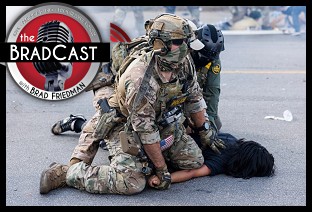 Trump Attempting His
Trump Attempting His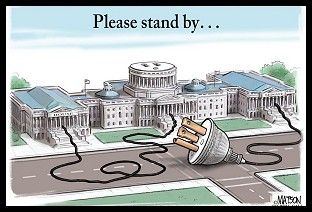 Sunday 'Shutshow' Toons
Sunday 'Shutshow' Toons Biden Budget Expert: Mass Firings in Shutdown 'Extremely Illegal': 'BradCast' 10/2/25
Biden Budget Expert: Mass Firings in Shutdown 'Extremely Illegal': 'BradCast' 10/2/25 'Green News Report' 10/2/25
'Green News Report' 10/2/25 Why is DOJ Suing 'Blue' States for Their Voter Databases?: 'BradCast' 10/1/25
Why is DOJ Suing 'Blue' States for Their Voter Databases?: 'BradCast' 10/1/25 'A War from Within' Trump's Twisted Mind: 'BradCast' 9/30/25
'A War from Within' Trump's Twisted Mind: 'BradCast' 9/30/25 'Green News Report' 9/30/25
'Green News Report' 9/30/25 'Fear is the Tool of a Tyrant':
'Fear is the Tool of a Tyrant': Sunday 'Long Arm/Small Man' Toons
Sunday 'Long Arm/Small Man' Toons 'Green News Report' 9/25/25
'Green News Report' 9/25/25 I Don't Know What This Means, But I Thought You Should Know: 'BradCast' 9/25/25
I Don't Know What This Means, But I Thought You Should Know: 'BradCast' 9/25/25 Gov't Shutdown Looms as Dems Fight to Save Healthcare Subsidies: 'BradCast' 9/24/25
Gov't Shutdown Looms as Dems Fight to Save Healthcare Subsidies: 'BradCast' 9/24/25 Updates: Homan Bribery; Kimmel Censorship; Our Insane Prez at U.N.: 'BradCast' 9/23/25
Updates: Homan Bribery; Kimmel Censorship; Our Insane Prez at U.N.: 'BradCast' 9/23/25 Trump 'Border Czar' Took $50k in Sting, DOJ Dropped the Case: 'BradCast' 9/22/25
Trump 'Border Czar' Took $50k in Sting, DOJ Dropped the Case: 'BradCast' 9/22/25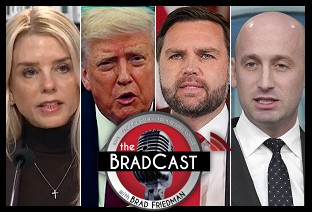 MAGA Exploiting Kirk's Death as Their 9/11: 'BradCast' 9/17/25
MAGA Exploiting Kirk's Death as Their 9/11: 'BradCast' 9/17/25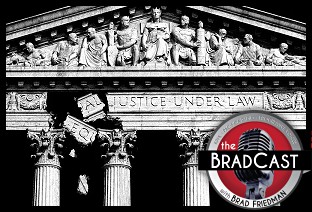 Our Crumbling Courts and Withering Rule of Law: 'BradCast' 9/16/25
Our Crumbling Courts and Withering Rule of Law: 'BradCast' 9/16/25 After Kirk Murder, 1st Amendment, Not 2nd, Under Attack: 'BradCast' 9/15/25
After Kirk Murder, 1st Amendment, Not 2nd, Under Attack: 'BradCast' 9/15/25 SCOTUS Suspension of 4th Amendment an Ominous Threat to Constitutional Republic
SCOTUS Suspension of 4th Amendment an Ominous Threat to Constitutional Republic
 VA GOP VOTER REG FRAUDSTER OFF HOOK
VA GOP VOTER REG FRAUDSTER OFF HOOK Criminal GOP Voter Registration Fraud Probe Expanding in VA
Criminal GOP Voter Registration Fraud Probe Expanding in VA DOJ PROBE SOUGHT AFTER VA ARREST
DOJ PROBE SOUGHT AFTER VA ARREST Arrest in VA: GOP Voter Reg Scandal Widens
Arrest in VA: GOP Voter Reg Scandal Widens ALL TOGETHER: ROVE, SPROUL, KOCHS, RNC
ALL TOGETHER: ROVE, SPROUL, KOCHS, RNC LATimes: RNC's 'Fired' Sproul Working for Repubs in 'as Many as 30 States'
LATimes: RNC's 'Fired' Sproul Working for Repubs in 'as Many as 30 States' 'Fired' Sproul Group 'Cloned', Still Working for Republicans in At Least 10 States
'Fired' Sproul Group 'Cloned', Still Working for Republicans in At Least 10 States FINALLY: FOX ON GOP REG FRAUD SCANDAL
FINALLY: FOX ON GOP REG FRAUD SCANDAL COLORADO FOLLOWS FLORIDA WITH GOP CRIMINAL INVESTIGATION
COLORADO FOLLOWS FLORIDA WITH GOP CRIMINAL INVESTIGATION CRIMINAL PROBE LAUNCHED INTO GOP VOTER REGISTRATION FRAUD SCANDAL IN FL
CRIMINAL PROBE LAUNCHED INTO GOP VOTER REGISTRATION FRAUD SCANDAL IN FL Brad Breaks PA Photo ID & GOP Registration Fraud Scandal News on Hartmann TV
Brad Breaks PA Photo ID & GOP Registration Fraud Scandal News on Hartmann TV  CAUGHT ON TAPE: COORDINATED NATIONWIDE GOP VOTER REG SCAM
CAUGHT ON TAPE: COORDINATED NATIONWIDE GOP VOTER REG SCAM CRIMINAL ELECTION FRAUD COMPLAINT FILED AGAINST GOP 'FRAUD' FIRM
CRIMINAL ELECTION FRAUD COMPLAINT FILED AGAINST GOP 'FRAUD' FIRM RICK SCOTT GETS ROLLED IN GOP REGISTRATION FRAUD SCANDAL
RICK SCOTT GETS ROLLED IN GOP REGISTRATION FRAUD SCANDAL VIDEO: Brad Breaks GOP Reg Fraud Scandal on Hartmann TV
VIDEO: Brad Breaks GOP Reg Fraud Scandal on Hartmann TV RNC FIRES NATIONAL VOTER REGISTRATION FIRM FOR FRAUD
RNC FIRES NATIONAL VOTER REGISTRATION FIRM FOR FRAUD EXCLUSIVE: Intvw w/ FL Official Who First Discovered GOP Reg Fraud
EXCLUSIVE: Intvw w/ FL Official Who First Discovered GOP Reg Fraud GOP REGISTRATION FRAUD FOUND IN FL
GOP REGISTRATION FRAUD FOUND IN FL

































